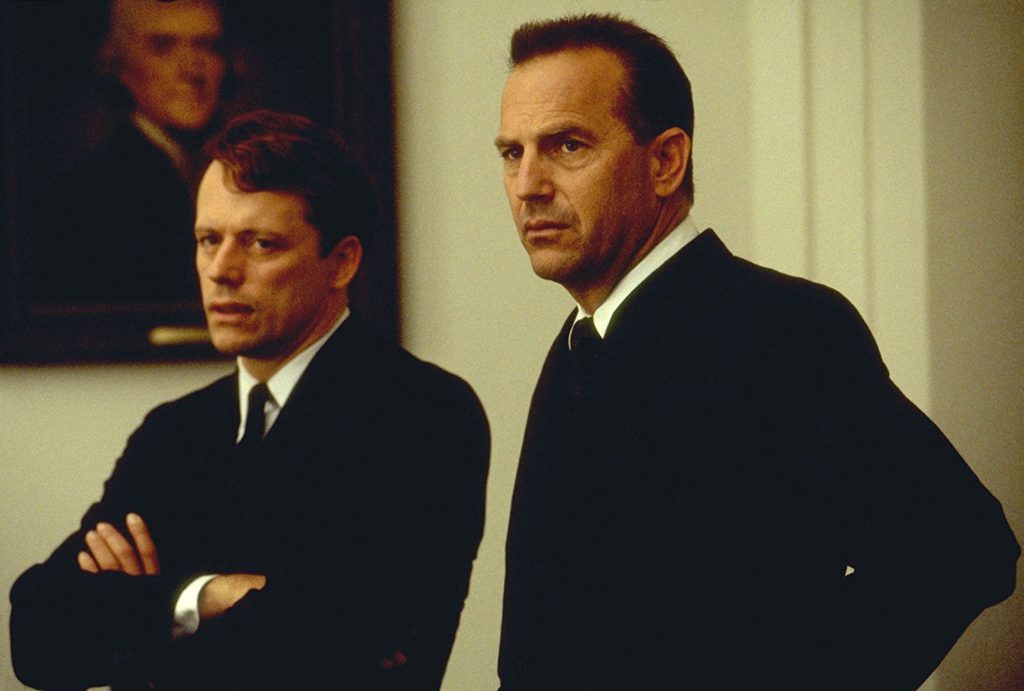Movie of the week: “Thirteen Days”
Thirteen days in Camelot
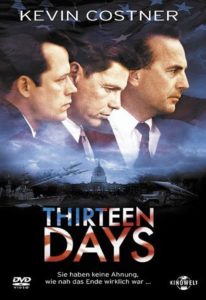 Many people do not understand why the whole world worries about the results of the US presidential election. As they are the richest and the most powerful militarily nation, it is natural that the choice of their ruler affects relations with the rest of the planet. While it takes weeks to count all their votes, It is worth remembering what can happen to the world, depending on their decisions.Fifty-five years ago, President John Fitzgerald Kennedy launched the world on alert, in a dark episode, which put the United States and the Soviet Union on the edge of a nuclear war.One of the first films to explore a little more critically this case was “Thirteen Days”, directed by Roger Donaldson.
Many people do not understand why the whole world worries about the results of the US presidential election. As they are the richest and the most powerful militarily nation, it is natural that the choice of their ruler affects relations with the rest of the planet. While it takes weeks to count all their votes, It is worth remembering what can happen to the world, depending on their decisions.Fifty-five years ago, President John Fitzgerald Kennedy launched the world on alert, in a dark episode, which put the United States and the Soviet Union on the edge of a nuclear war.One of the first films to explore a little more critically this case was “Thirteen Days”, directed by Roger Donaldson.
Quite apart from the myth, Kennedy was an incorrigible womanizer, extremely ambitious man who pursued his father’s project to dominate power in America. Along with his brother Bob (Robert Kennedy, who also would be assassinated in 1968), he led the presidency as a way to achieve his personal goals. They both believed that they were special people, not subject to the rules imposed on other mortals.
Corruption and the use of the state for personal purposes was a long tradition in the JFK family since his grandparents. His father, Joseph Kennedy, became ambassador to England thanks to his friendship with the then-President Roosevelt’s son. He ended up losing his job, and the chance to run for presidency for conspiring against the nation’s own boss. Today, it is known that he was involved even with liquor smuggling during Prohibition, including using the post of ambassador to gain space on ships for his illegal charges.
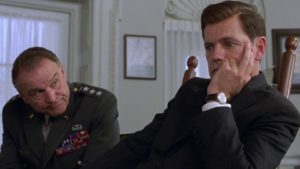 Through a very well-defined project, John Kennedy began his career toward the presidency. The natural candidate was Joe, the eldest son, who disappeared during World War II. Using all means, possible and imaginable, JFK passed through the Senate, and finally reached the top position of American power. To get there, he used the services of an old family friend, Sam Giancana, a Chicago mafia. After the election, many allegations of election fraud in Illinois reached the Justice Department – which was headed by his brother Bob Kennedy. None of the charges, of course, came to be investigated.
Through a very well-defined project, John Kennedy began his career toward the presidency. The natural candidate was Joe, the eldest son, who disappeared during World War II. Using all means, possible and imaginable, JFK passed through the Senate, and finally reached the top position of American power. To get there, he used the services of an old family friend, Sam Giancana, a Chicago mafia. After the election, many allegations of election fraud in Illinois reached the Justice Department – which was headed by his brother Bob Kennedy. None of the charges, of course, came to be investigated.
Kennedy’s relations with gangster Giancana included plans for the assassination of Fidel Castro, and a common lover, Judith Exner. According to her, bags full of money were sent through her from the president to the mafioso, or from Californian entrepreneurs to JFK.
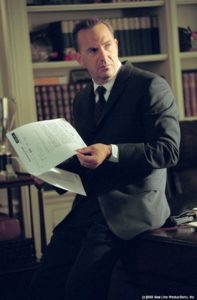 All the activities of the Kennedy family were monitored since the 1940s by Edgar Hoover, director of the FBI. Believing that the institution of the presidency was more important than the man who occupied it, Hoover did not prevent Kennedy from being elected. In return, his reinstatement as director of the birô was one of the first acts of the young president.
All the activities of the Kennedy family were monitored since the 1940s by Edgar Hoover, director of the FBI. Believing that the institution of the presidency was more important than the man who occupied it, Hoover did not prevent Kennedy from being elected. In return, his reinstatement as director of the birô was one of the first acts of the young president.
Like Hoover, the Secret Service also believed he had to preserve the president’s image – which he himself did not care about. Sometimes the agents guarding the president had to work miracles to prevent First Lady Jackie from entering the White House recreation area where John and Bob were doing lively parties with prostitutes.
The crisis of the missiles of Cuba was the great event of the Kennedy administration. The small Caribbean island was a pain in the ass of JFK since April of 1961. On that date, a brigade of 1400 Cuban refugees, backed by the CIA, landed in the Bay of Pigs, to try to overthrow Fidel Castro. The disorganization of the coup, coupled with the withdrawal of air support – ordered by JFK himself – resulted in the death of 112 invaders, and in the arrest of the remainder. It was a complete fiasco.
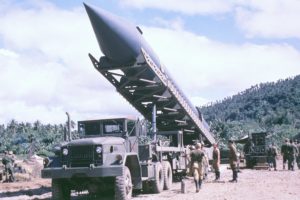 Amid sweeping plans to assassinate the Cuban leader, the Americans discovered through U-2 spy plane flights that bases for launching ballistic missiles were being assembled in Cuba. The “Thirteen Days”, which gave the title to the film, refer to the period between the discovery, and the time in which the weapons would be operational. By the official version, Kennedy imposed a naval blockade on Cuba, which forced the Russians to remove the missiles. Homeric applauses.
Amid sweeping plans to assassinate the Cuban leader, the Americans discovered through U-2 spy plane flights that bases for launching ballistic missiles were being assembled in Cuba. The “Thirteen Days”, which gave the title to the film, refer to the period between the discovery, and the time in which the weapons would be operational. By the official version, Kennedy imposed a naval blockade on Cuba, which forced the Russians to remove the missiles. Homeric applauses.
The story under the table is a little bit different.Even in an era of arms race, Soviet military power was far less than American. To give you an idea, while the United States had 300 missile launchers, the Russians would have a maximum of forty-four – already counting on those from Cuba.
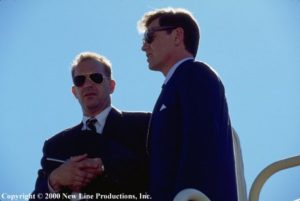 In his irrational hatred of the Cubans, Kennedy bravado in a position of bully, while running desperately, along with Brother Bob, for a negotiated solution. To this end, they even used the services of a KGB agent, bypassing formal diplomatic channels.
In his irrational hatred of the Cubans, Kennedy bravado in a position of bully, while running desperately, along with Brother Bob, for a negotiated solution. To this end, they even used the services of a KGB agent, bypassing formal diplomatic channels.
No one wanted a nuclear war, but most of all, Kennedy wanted re-election. So, even having made an agreement with Khrushchev, the leader of the Soviet Union, he kept the propaganda of the world’s sheriff. Under the agreement, the Soviet missiles would be withdrawn from Cuba in exchange for American missiles in Turkey and – most importantly – the guarantee that Fidel’s island would never undergo an invasion of the United States. The Cubans were the great winners of the missile crisis.
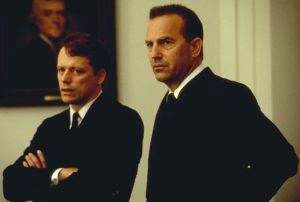 To the world, what was seen was the eve of a nuclear holocaust. The Strategic Air Command fleet, with more than 1,400 B-52 and B-47 bombers, plus 174 intercontinental ballistic missiles, entered DEFCON 2, which is the last stage before the war. An eighth of all American airplanes remained in the air for thirty days. More than a hundred thousand men were stationed on the East Coast, while a naval force, with forty thousand Marines, sailed in the Caribbean and South Atlantic. Meanwhile, from the Soviet side, there was no activity that was not routine.
To the world, what was seen was the eve of a nuclear holocaust. The Strategic Air Command fleet, with more than 1,400 B-52 and B-47 bombers, plus 174 intercontinental ballistic missiles, entered DEFCON 2, which is the last stage before the war. An eighth of all American airplanes remained in the air for thirty days. More than a hundred thousand men were stationed on the East Coast, while a naval force, with forty thousand Marines, sailed in the Caribbean and South Atlantic. Meanwhile, from the Soviet side, there was no activity that was not routine.
As the Kennedys intended to hold for at least another ten years in power (with a re-election of John, and then the double Bob-John), it is possible that the Soviets preferred to leave Americans savoring a false victory, information that would practically keep the Kennedy in their hands. Only John’s death undid both the Kennedy’s ambitions and this hypothetical Russian threat.
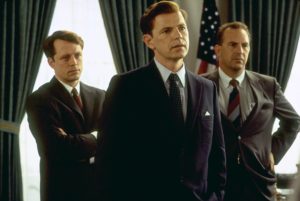 The movie “Thirteen Days” touched on a lot of these delicate points, including the sibling-driven dealings, but it avoided showing the more personal (and messy) side of JFK. The story was shown from the standpoint of Kennedy’s top aide, Kenneth O ‘Donnell, on whom he weighed allegations of misappropriation of the 1964 campaign for his own use. Who plays O’Donnell is Kevin Costner, who had starred in another film about Kennedy, “JFK” (1991) where he played the promoter who investigated the president’s death. It’s a shame that Bruce Greenwood, the actor chosen for the role of Kennedy, had little physical similarity with JFK. After all, the charm and personal magnetism of JFK was undeniable.
The movie “Thirteen Days” touched on a lot of these delicate points, including the sibling-driven dealings, but it avoided showing the more personal (and messy) side of JFK. The story was shown from the standpoint of Kennedy’s top aide, Kenneth O ‘Donnell, on whom he weighed allegations of misappropriation of the 1964 campaign for his own use. Who plays O’Donnell is Kevin Costner, who had starred in another film about Kennedy, “JFK” (1991) where he played the promoter who investigated the president’s death. It’s a shame that Bruce Greenwood, the actor chosen for the role of Kennedy, had little physical similarity with JFK. After all, the charm and personal magnetism of JFK was undeniable.
Despite not having gone deeper into JFK’s personality, the movie “Thirteen Days” is a very well done movie exercise. In it there is a mixture of action film, historical account, political drama and period reconstitution. After all, there is no absolute truth, and we must form our own belief from the maximum information available. This movie is just one of these sources.
Original Title: “Thirteen Days”

